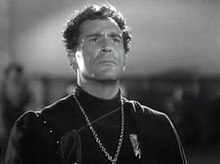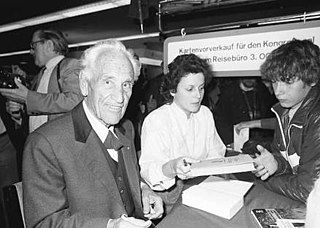
Luis Trenker was a South Tyrolean film producer, director, writer, actor, architect, alpinist, and bobsledder.

Invisible Chains is a 1942 Italian drama film directed by Mario Mattoli and starring Alida Valli, Carlo Ninchi and Giuditta Rissone. It was shot at the Cinecittà Studios in Rome. The film's sets were designed by the art directors Ottavio Scotti and Mario Rappini.

Difficult Years is a 1948 Italian drama film directed by Luigi Zampa and starring Umberto Spadaro, adapted from the 1946 short story Vecchio con gli stivali, by the Sicilian author Vitaliano Brancati.

Mussolini and I is a 1985 made-for-television docudrama film directed by Alberto Negrin. It chronicles the strained relationship between Italy's fascist dictator Benito Mussolini and his son-in-law and foreign minister, Count Galeazzo Ciano, based on Ciano's diaries. Made in English as an Italian-French-German-Swiss-Spanish-US co-production, with Bob Hoskins, Anthony Hopkins and Susan Sarandon in the leading roles, it first aired on Rai Uno on 15 April 1985 in a 130-minute version. On 8 September 1985, it premiered in the USA on HBO in an extended four-hour version.
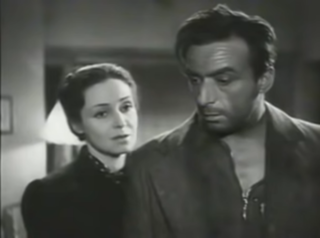
Bengasi is a 1942 Italian war film directed by Augusto Genina and starring Fosco Giachetti, Maria von Tasnady and Amedeo Nazzari. The film was shot at Cinecittà in Rome. The film was a propaganda work, designed to support the Fascist regime of Benito Mussolini. It portrays Allied atrocities in "Bengasi Italiana", such as the murder of a peasant by a group of drunken Australian soldiers.

100 Years of Love is a 1954 Italian anthology film directed by Lionello De Felice. It stars actor Gabriele Ferzetti.

Department Store is a 1939 Italian "white-telephones" comedy film directed by Mario Camerini.
Dora Nelson is a 1939 Italian comedy film directed by Mario Soldati and starring Assia Noris, Carlo Ninchi and Luigi Cimara. It is a remake of the 1935 French film of the same title, which was based on a play by Louis Verneuil. The film was shot at Cinecittà in Rome, with several real employees of the studio appearing as themselves. It belongs to the movies of the calligrafismo style.

Headlights in the Fog is a 1942 Italian drama film directed by Gianni Franciolini and starring Fosco Giachetti, Luisa Ferida and Antonio Centa. The film's art direction was by Camillo Del Signore. It was made at the Palatino Studios in Rome and on location in Piedmont and Liguria.

Laura Nucci was an Italian film actress. Nucci was one of the stars of the Fascist era, emerging after she won a competition. Her career was setback by the downfall of Benito Mussolini's regime, but from 1950 she began appearing in films again as a character actress. She also appeared in television, such as the 1957 series Pride and Prejudice.
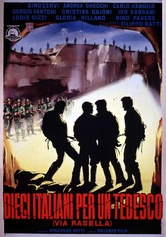
Ten Italians for One German, is a 1962 Italian historical war drama film directed by Filippo Walter Ratti. It is a dramatization of the Fosse Ardeatine massacre.
Luisa Sanfelice is a 1942 Italian historical drama film directed by Leo Menardi and starring Laura Solari, Massimo Serato and Osvaldo Valenti. The film is an adaptation of a novel by Alexandre Dumas based on the story of Luisa Sanfelice (1764-1800) an Italian aristocrat executed in Naples by Ferdinand I for supporting a Republican attempt to overthrow him during the French Revolutionary Wars. Horatio Nelson and Lady Hamilton both feature prominently.
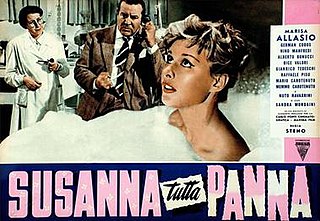
Susanna Whipped Cream is a 1957 Italian-Spanish romantic comedy film directed by Steno.
For Men Only is a 1938 Italian "white-telephones" comedy film directed by Guido Brignone and starring Antonio Gandusio, Carlo Buti and Paola Barbara.

The Three Thieves is a 1954 Italian-French comedy film directed by Lionello De Felice and starring Totò, Jean-Claude Pascal and Simone Simon.
Black Shirt is a 1933 Italian drama film directed by Giovacchino Forzano. The film was made by the Istituto Luce as a propaganda work to commemorate the tenth anniversary of Mussolini's Fascist regime. It portrays events in Italy from the beginning of the First World War to the coming to power of Mussolini and the transformation of the country since. It combines elements of normal fiction films, documentary and futurist influences.

The Ten Commandments is a 1945 Italian drama film directed by Giorgio Walter Chili. It features an ensemble of Italian actors in episodes based on the Ten Commandments.

Maria Malibran is a 1943 Italian historical drama film directed by Guido Brignone and starring Maria Cebotari, Rossano Brazzi, and Renato Cialente. It is based on the life of the Spanish singer Maria Malibran. It was shot at the Cinecittà Studios in Rome. The film's sets were designed by the art directors Virgilio Marchi and Gino Brosio.

Disowned is a 1955 Italian historical melodrama film directed by Giorgio Walter Chili and starring Alberto Farnese, Hélène Rémy and Laura Nucci.
